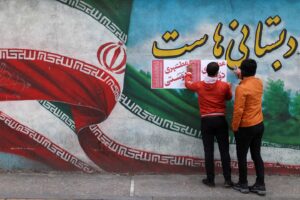[ad_1]
“Frankly speaking, due to my youth and stupidity, I admit that it was my mistake,” Zaluzhny, who is 50, said in an interview with The Washington Post. “It was actually a disaster.”
The moment was a setback in the crucial — and complicated — relationship between the two military commanders, who ultimately grew personally close as they worked together in Ukraine’s existential fight. Zaluzhny, who had been in Ukraine’s top post for less than a year when Russia attacked, said he came to depend on Milley, who retired last month at the age of 65, for thoughts on strategy, and to help secure the weapons he felt Ukrainian troops needed.
But the relationship, like the larger wartime ties between Washington and Kyiv, remained charged. While U.S. officials vowed to continue supplying arms and intelligence to keep Russia at bay, they sometimes chafed at Ukraine’s demands for more, and faster, deliveries. And while the Ukrainians were grateful for U.S. aid, they bristled at requests that they limit strikes on Russian territory.
Over 19 months, Zaluzhny and Milley spent hours discussing battlefield developments in regular calls. So far, the United States has funneled more than $40 billion in equipment to Kyiv, becoming the largest donor of military aid. And Milley, in his role as gatekeeper to America’s vast arsenal, represented a lifeline for Ukrainian military leaders as they fought a far larger and better-armed foe.
Milley’s Sept. 30 retirement marked the end of a working relationship that Zaluzhny has described as critical to Ukraine’s battlefield successes. He must now build a rapport with Milley’s successor, Air Force Gen. Charles Q. Brown Jr. The two men have not spoken since Brown took over last week.
Zaluzhny’s personal bond with the outgoing U.S. chief, however, is something he said he expects will endure. For the Ukrainian general, Milley’s larger-than-life personality, his deep connections across U.S. power structures and his battlefield credentials — with a deep record commanding troops in counterinsurgent wars — made him a valuable ally.
White House seeks a path forward on Ukraine amid House turmoil
The brash Boston-area native, a former Green Beret, had a forceful role in shaping the Biden administration’s response to the war. Zaluzhny also credited Milley with rallying other NATO generals to Ukraine’s side. “I can’t even imagine if it had been anyone else,” Zaluzhny said. “We have a friendship. It’s hard to imagine. He’s an older man, but he’s cool.”
Regularly ribbing Milley about his age became an inside joke, a sign of the comfort Zaluzhny grew to feel around Milley.
But as Russian troops surrounded Kyiv early in the invasion, and Zaluzhny appealed for help with air power, the tension was intense.
Milley, facing mounting pressure to send fighter jets, requested an intelligence rundown of Ukraine’s fleet, down to the location and maintenance status of each plane, said a U.S. official who spoke on the condition of anonymity to describe sensitive discussions. The Pentagon did not believe the jets would help, and feared Russia’s reaction.
When Milley pushed back by reading the inventory aloud, there was a long silence. Zaluzhny insisted the numbers were wrong. He stewed for a week but said he ultimately realized that his country’s future deeply depended on close communication.
“I was stubborn, just like he was,” Zaluzhny said. “But he was smarter, and I was dumber. In the end, I gave up.” It is still not clear who was right about the planes, but Biden has since agreed to allow the transfer of F-16s to Kyiv.
Ukraine’s top general, Valery Zaluzhny, wants shells, planes and patience
More than a year later, Zaluzhny said his willingness to push back might have earned him some respect in Milley’s eyes.
Milley brushed off the disagreement. “He is a human being,” he recollected in a recent interview with The Post. “His country has been invaded by hundreds of thousands of Russian troops. … His back is up against the wall. The level of pressure is intense.”
“The fact that somebody gets a little angry and mad, absolutely normal,” he said. “And I understood that. I’m 5,000 miles away.”
The generals, of course, have an interest in masking disagreements between them, or their governments. Still, the dealings between Milley and Zaluzhny echoed the sometimes chummy and sometimes strained ties between top military officials at consequential moments.
When retired American Adm. James Stavridis served as NATO’s supreme allied commander during the Obama administration, he regularly called his Russian counterpart, Gen. Nikolai Makarov. In what would seem impossible today, the men shared what Stavridis described as “positive professional and personal moments” during talks at NATO headquarters and in Moscow.
“Such connections are invaluable, and can diffuse the most dangerous of moments,” he said.
The Milley-Zaluzhny dynamic was different from its historical parallels: Unlike in the post-Cold War period, Washington and Moscow are now fierce adversaries. And unlike in World War II, American troops are on the sidelines of this fight.
The two generals’ interactions settled into a routine.
They would speak through an interpreter on a secure line, generally with each call structured in the same way. Zaluzhny gave Milley his assessment of what was happening on the battlefield. Milley answered with U.S. intelligence on the same. Then, they would shift to resources: What did Ukraine need for the next 30, 60, or 90 days? How could Washington help?
There were still disputes. “I always argue with him,” Zaluzhny said — but those disagreements were buffered by mutual respect.
Zaluzhny, who grew up in a Soviet military family but dreamed of being part of a Ukrainian army that met NATO standards, described Milley as “an outside power source,” someone to call when he felt stuck.
Gen. Mark Milley, polarizing Joint Chiefs chairman, exits center stage
In one conversation shortly before Putin’s invasion, Milley deviated from the professional to the personal. He asked Zaluzhny where his family would be while Zaluzhny commanded Ukraine’s forces against what officials feared would be a massive attack?
Zaluzhny replied that his wife, Olena, and children would remain in Kyiv. One of his two daughters, trained in medicine, would be treating the wounded; the other would be serving in the military. “We will fight and die in Kyiv, if necessary,” Zaluzhny told him.
“That’s when I said, ‘Wow,’” Milley said. “These guys are serious guys. And he’s just representative of the Ukrainian people in my mind. And he’s totally committed to defending his country.”
Milley’s final months in office were dominated by Ukraine’s push to regain Russian-occupied territory in an ongoing counteroffensive. At times, some U.S. officials have objected to Kyiv’s decisions, including its reluctance to employ mechanized units and its allocation of forces across a long front line. The two countries’ cooperation was strained when a major leak of U.S. intelligence material spilled sensitive information about Ukraine’s defenses and its counteroffensive.
Zaluzhny and Milley’s first in-person meeting took place at the Poland-Ukraine border earlier this year. They spent several hours poring over maps showing the battlefield and discussed Zaluzhny’s counteroffensive plans. It was professional and productive, but months later, Zaluzhny regretted it was so formal.
“I realize now that he’s not going to be here anytime soon,” Zaluzhny said. “That man deserved that I should have done something differently.”
“We could have met as good friends,” Zaluzhny added. “After the official part, we could have just had a normal conversation.”
Zaluzhny said he hopes a more casual meeting will come later.
He said Milley has told him to visit him after the war and suggested he could help the Ukrainian general obtain an honorary degree from the U.S. Military Academy. Zaluzhny promised Milley that Ukraine’s General Staff will install a bust of him on its grounds as a display of gratitude.
Milley voiced confidence that his exit would not disrupt the partnership between the U.S. and Ukrainian militaries.
“The fact that people move or they’re replaced is matter of routine” in military operations, he said. “I have a very good relationship with General Zaluzhny, but the war is not going to be won or lost off his relationship and my relationship.”
Ryan reported from Tallinn, Estonia.
[ad_2]
Source link





